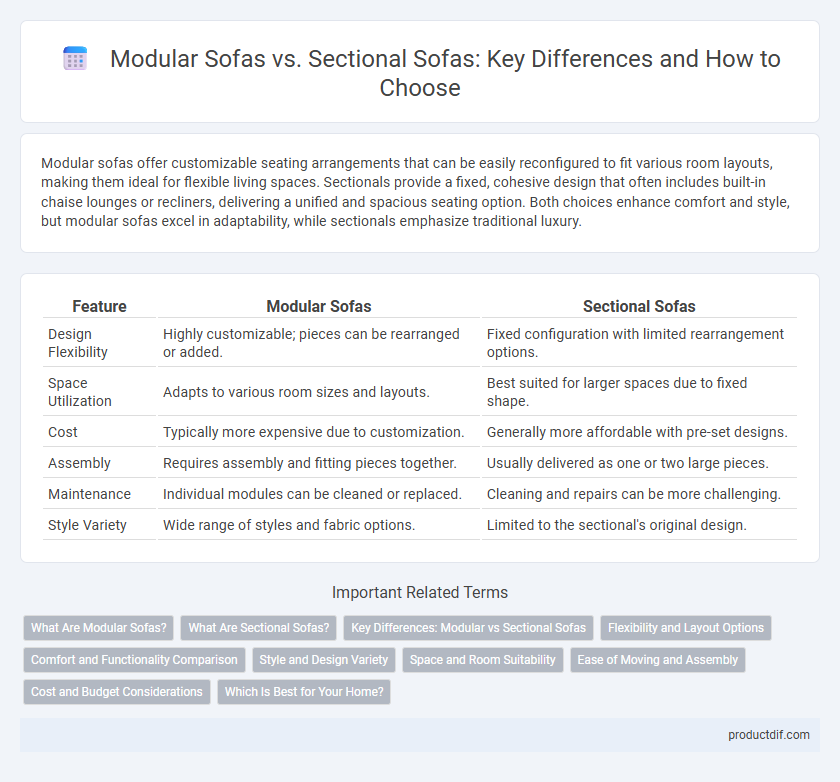Modular sofas offer customizable seating arrangements that can be easily reconfigured to fit various room layouts, making them ideal for flexible living spaces. Sectionals provide a fixed, cohesive design that often includes built-in chaise lounges or recliners, delivering a unified and spacious seating option. Both choices enhance comfort and style, but modular sofas excel in adaptability, while sectionals emphasize traditional luxury.
Table of Comparison
| Feature | Modular Sofas | Sectional Sofas |
|---|---|---|
| Design Flexibility | Highly customizable; pieces can be rearranged or added. | Fixed configuration with limited rearrangement options. |
| Space Utilization | Adapts to various room sizes and layouts. | Best suited for larger spaces due to fixed shape. |
| Cost | Typically more expensive due to customization. | Generally more affordable with pre-set designs. |
| Assembly | Requires assembly and fitting pieces together. | Usually delivered as one or two large pieces. |
| Maintenance | Individual modules can be cleaned or replaced. | Cleaning and repairs can be more challenging. |
| Style Variety | Wide range of styles and fabric options. | Limited to the sectional's original design. |
What Are Modular Sofas?
Modular sofas consist of individual, movable pieces that can be arranged and reconfigured to suit various living spaces and seating needs, offering maximum flexibility and customization. Each module, such as armless chairs, corner units, and ottomans, functions independently, allowing users to create unique layouts tailored to room size and style preferences. This adaptability makes modular sofas ideal for dynamic interiors and multifunctional rooms, contrasting with fixed-shape sectionals that have predetermined configurations.
What Are Sectional Sofas?
Sectional sofas are versatile seating arrangements composed of multiple connected pieces designed to fit together in various configurations, providing ample seating for large spaces. Typically including components like chaise lounges, corner pieces, and armless units, sectionals offer customizable layouts to suit different room shapes and sizes. Their modular design allows for flexibility in placement and the ability to accommodate both small and large gatherings seamlessly.
Key Differences: Modular vs Sectional Sofas
Modular sofas consist of individual pieces that can be rearranged or expanded to fit different room shapes and seating needs, offering flexibility and customization, whereas sectional sofas are typically fixed in a specific configuration with fewer rearrangement options. Modular sofas often feature detached cushions and varying shapes, allowing users to create a tailored seating arrangement, while sectionals usually come as L-shaped or U-shaped units designed for a cohesive look. The choice between modular and sectional sofas impacts space utilization, adaptability, and design versatility in living room furniture.
Flexibility and Layout Options
Modular sofas offer superior flexibility with individual pieces that can be rearranged to fit various room layouts, making them ideal for dynamic living spaces. Sectional sofas come in fixed configurations that, while spacious, limit customization and adaptability to changing room needs. Choosing modular sofas allows for seamless expansion or reduction, catering to both small apartments and large open-plan areas with ease.
Comfort and Functionality Comparison
Modular sofas offer unparalleled customization and flexibility, allowing users to rearrange individual pieces to fit various room layouts and enhance comfort tailored to personal preferences. Sectional sofas provide large, continuous seating areas ideal for accommodating multiple people simultaneously, combining comfort with a cohesive design suitable for social gatherings. Both options prioritize ergonomic support and durable upholstery materials, but modular sofas excel in adaptability while sectionals emphasize unified aesthetics and spaciousness.
Style and Design Variety
Modular sofas offer unparalleled flexibility with customizable configurations and interchangeable pieces, allowing homeowners to adapt the design to fit unique spaces and evolving tastes. Sectionals typically come in fixed layouts, providing a cohesive, streamlined appearance but with fewer options for rearrangement. Both options feature diverse upholstery materials and color palettes, but modular sofas excel in blending contemporary innovations with personalized style preferences.
Space and Room Suitability
Modular sofas offer versatile configurations ideal for small or irregularly shaped rooms, maximizing space efficiency without sacrificing comfort. Sectionals generally require larger, open areas due to their fixed arrangements but provide expansive seating perfect for spacious living rooms. Choosing between modular sofas and sectionals depends on the room layout and available square footage to optimize both functionality and aesthetic appeal.
Ease of Moving and Assembly
Modular sofas offer superior ease of moving and assembly due to their smaller, individual pieces that can be easily rearranged or transported through tight spaces. Sectionals, while providing cohesive design, often consist of larger, connected segments making them bulkier and more challenging to maneuver or assemble without professional help. Choosing modular options increases flexibility for room layout changes and simplifies the relocation process.
Cost and Budget Considerations
Modular sofas offer flexible configurations that can be adjusted to fit various room sizes and layouts, often allowing consumers to build their seating arrangement over time to better manage their budget. Sectionals typically come as a fixed set of pieces, which may result in a higher initial cost but provide a cohesive design without the need for additional purchases. When comparing cost efficiency, modular sofas generally present a more budget-friendly option due to their customizable nature and potential for incremental investment.
Which Is Best for Your Home?
Modular sofas offer customizable configurations that adapt to various room layouts, making them ideal for dynamic living spaces and frequent redecoration. Sectional sofas provide a cohesive design with integrated pieces, perfect for larger areas needing ample seating and a unified aesthetic. Choosing between modular and sectional depends on your home's size, flexibility needs, and style preferences.
Modular sofas vs Sectionals Infographic

 productdif.com
productdif.com